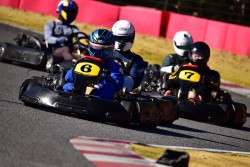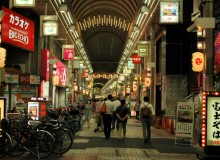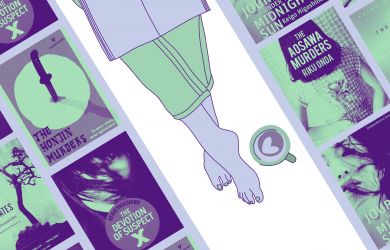
Originally published on metropolis.co.jp on November 2011

Hitting the pavement
- A street protest in Roppongi inspired by the Occupy Wall Street demonstrations drew a total of… 80 people.
- One participant reportedly said he “wanted to call for the correction of income disparities in Roppongi, which represents wealth.” Funny, we always thought Roppongi represented “foreign guys hooking up with Japanese women.”
- A citizen’s group uncovered a classified WWII-era report detailing how the Imperial Army waged biological warfare on Chinese civilians by unleashing fleas infected with plague bacteria. A total of 25,946 people were infected from 1940 to 1942.
- Here we go again: Chief Cabinet Secretary Osamu Fujimura says that the demand for electricity this winter is expected to exceed supply “by several percent” in some regions.
Men of few words
- After being arrested for forging marriage certificates on behalf of a Chinatown restaurant owner, a Yokohama Municipal Assembly member told police, “I don’t want to talk about it.”
- During a reception for Japan’s World Cup-winning women’s soccer team at the Imperial Palace, the Emperor told the squad’s captain, “Your team must have practiced very much.”
- After being informed that his ¥17.74 million personal net worth is the lowest among all prime ministers since financial disclosure laws were enacted in 1984, Yoshihiko Noda told reporters, “I cannot do anything about the figure.”
- During a hearing tied to a capital murder case in Osaka, a former high-ranking prosecutor told the court, “The death penalty itself is not unconstitutional, but death by hanging [is].”
Sic Transit
- An 82-year-old man in Osaka drove his car a distance of 1km along railway tracks on the Nara line. The man said he “panicked” when, after accidentally steering onto the tracks, the crossing gates began closing ahead of an approaching train.
- A quick-thinking passenger was credited with averting a disaster when he grabbed the wheel of a tour bus whose driver fell unconscious on a highway in Hokkaido.
- A government study group has recommended that air traffic controllers be banned from bringing PCs and cellphones to work to prevent the leak of “sensitive information.”
- Hawaiian Airlines issued an apology after one of its planes improperly taxied onto a runway at Kansai Airport, forcing an approaching ANA cargo plane to abandon its approach a mere two minutes before it was scheduled to land.
- The Metropolitan Police Department says that the increase in the number of people who commute by bicycle following the March 11 disaster is responsible for the drastic rise in bike accidents in Tokyo. There were 56 such crashes in April 2010, but 400 during the same month this year, according to the MPD.
That’s just weird…
- Nagano police tentatively identified a dead man whose corpse showed “traces of a breast enlargement operation” as 37-year-old Michael William Tokuhara of Tokyo.
- The mayor of Setagaya-ku said that extremely high radiation readings detected at a local residence were not related to the accident at Fukushima Daiichi nuclear plant.
- A batch of debris from the March 11 disaster, including household appliances and a 6m-long fishing boat, was found near the Midway Islands—some 3,200km distant from Japan.
- A husband-and-wife research team at Gunma University has produced a study that “shed[s] light on the mysterious process by which a certain type of gene is passed on to children from mothers alone.”
The body politic
- When questioned about her ownership of 1,500 shares of TEPCO stock, newly installed health minister Yoko Komiyama said she inherited them from her father and, anyway, she “has nothing to do with TEPCO.”
- A national labor board suggested that the salary of civil servants be cut by 0.23 percent to help finance post-quake reconstruction, but the government said it will instead slay the pay of public-sector employees by a whopping 7.8 percent.
- Peace-loving no more: lawmakers say they are rethinking Japan’s long-standing ban on the export of “weapons and related technologies.”
- Sentence of the Week: “The National Police Agency has taken the unusual step of telling the operator of the Sukiya gyudon beef bowl chain to tighten its security measures—again—after its outlets were targeted in 90 percent of robberies on such restaurants in the first nine months of this year.” (via The Daily Yomiuri)
Those pesky foreigners
- It was reported that locals in Shin Okubo’s Koreatown are fed up with “the bad manners” of visitors who have been swarming to the neighborhood during the recent K-pop boom.
- The defense ministry says that, from April to September, its fighter jets were scrambled 83 times in response to Chinese aircraft approaching Japanese airspace.
- The government announced that it may lift some of the restrictions it had placed on imports of American beef following an outbreak of BSE in the US in 2003.
- The justice ministry said it was planning to “greatly simplify” the immigration procedure for foreign tourists.
This just in…
- The Supreme Court dismissed a suit by Okinawa residents who had complained that excessive noise from helicopters at the US’s Funtenma air station “amplified [their] mental distress.”
- Thanks to a rise in stocks of southern bluefin tuna, an international conservation commission is allowing Japan to increase its catch quota from 2,261 tons to 3,366 tons by 2014.
- Nissan tested its latest “ultracompact” electric car—the New Mobility Concept vehicle—which measures just 2.34m long and 1.19m wide—on the streets of Yokohama. It was the first time the four-wheelers had been taken for a spin on public roads.
- Bottom Story of the Week: “Health Ministry Team Releases Criteria for Judging Cerebrospinal Fluid Leakage.” (via The Mainichi Daily News)
Compiled from reports by AP, Japan Today, The Japan Times, The International Herald Tribune, The Asahi Shimbun, The Mainichi Daily News, Daily Yomiuri, AFP, Reuters and Kyodo







